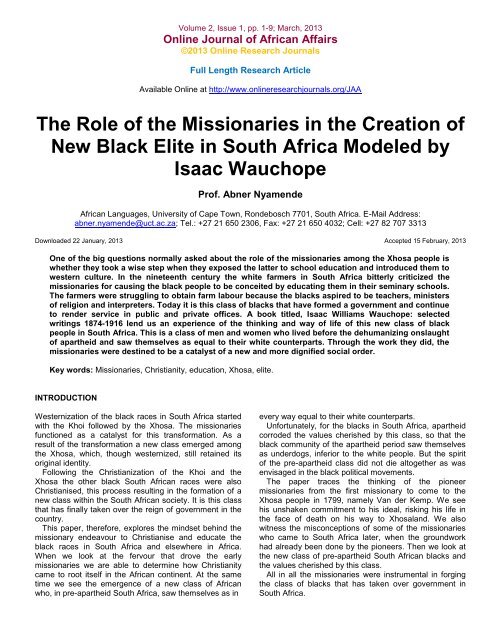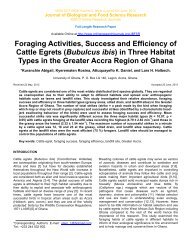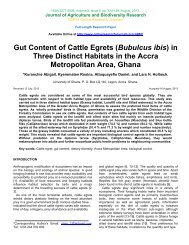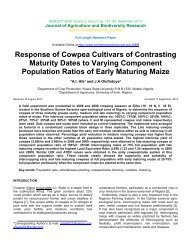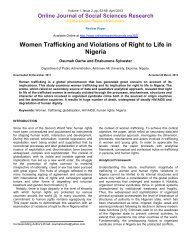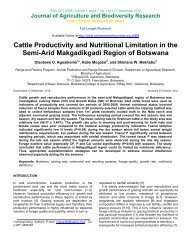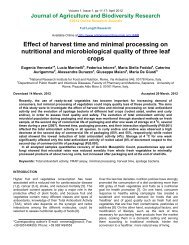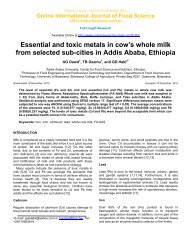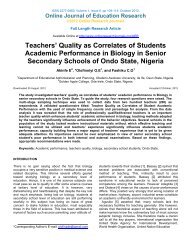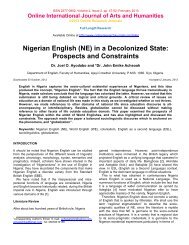Reprint (PDF) - Online Research Journals
Reprint (PDF) - Online Research Journals
Reprint (PDF) - Online Research Journals
Create successful ePaper yourself
Turn your PDF publications into a flip-book with our unique Google optimized e-Paper software.
Volume 2, Issue 1, pp. 1-9; March, 2013<br />
<strong>Online</strong> Journal of African Affairs<br />
©2013 <strong>Online</strong> <strong>Research</strong> <strong>Journals</strong><br />
Full Length <strong>Research</strong> Article<br />
Available <strong>Online</strong> at http://www.onlineresearchjournals.org/JAA<br />
The Role of the Missionaries in the Creation of<br />
New Black Elite in South Africa Modeled by<br />
Isaac Wauchope<br />
Prof. Abner Nyamende<br />
African Languages, University of Cape Town, Rondebosch 7701, South Africa. E-Mail Address:<br />
abner.nyamende@uct.ac.za; Tel.: +27 21 650 2306, Fax: +27 21 650 4032; Cell: +27 82 707 3313<br />
Downloaded 22 January, 2013 Accepted 15 February, 2013<br />
One of the big questions normally asked about the role of the missionaries among the Xhosa people is<br />
whether they took a wise step when they exposed the latter to school education and introduced them to<br />
western culture. In the nineteenth century the white farmers in South Africa bitterly criticized the<br />
missionaries for causing the black people to be conceited by educating them in their seminary schools.<br />
The farmers were struggling to obtain farm labour because the blacks aspired to be teachers, ministers<br />
of religion and interpreters. Today it is this class of blacks that have formed a government and continue<br />
to render service in public and private offices. A book titled, Isaac Williams Wauchope: selected<br />
writings 1874-1916 lend us an experience of the thinking and way of life of this new class of black<br />
people in South Africa. This is a class of men and women who lived before the dehumanizing onslaught<br />
of apartheid and saw themselves as equal to their white counterparts. Through the work they did, the<br />
missionaries were destined to be a catalyst of a new and more dignified social order.<br />
Key words: Missionaries, Christianity, education, Xhosa, elite.<br />
INTRODUCTION<br />
Westernization of the black races in South Africa started<br />
with the Khoi followed by the Xhosa. The missionaries<br />
functioned as a catalyst for this transformation. As a<br />
result of the transformation a new class emerged among<br />
the Xhosa, which, though westernized, still retained its<br />
original identity.<br />
Following the Christianization of the Khoi and the<br />
Xhosa the other black South African races were also<br />
Christianised, this process resulting in the formation of a<br />
new class within the South African society. It is this class<br />
that has finally taken over the reign of government in the<br />
country.<br />
This paper, therefore, explores the mindset behind the<br />
missionary endeavour to Christianise and educate the<br />
black races in South Africa and elsewhere in Africa.<br />
When we look at the fervour that drove the early<br />
missionaries we are able to determine how Christianity<br />
came to root itself in the African continent. At the same<br />
time we see the emergence of a new class of African<br />
who, in pre-apartheid South Africa, saw themselves as in<br />
every way equal to their white counterparts.<br />
Unfortunately, for the blacks in South Africa, apartheid<br />
corroded the values cherished by this class, so that the<br />
black community of the apartheid period saw themselves<br />
as underdogs, inferior to the white people. But the spirit<br />
of the pre-apartheid class did not die altogether as was<br />
envisaged in the black political movements.<br />
The paper traces the thinking of the pioneer<br />
missionaries from the first missionary to come to the<br />
Xhosa people in 1799, namely Van der Kemp. We see<br />
his unshaken commitment to his ideal, risking his life in<br />
the face of death on his way to Xhosaland. We also<br />
witness the misconceptions of some of the missionaries<br />
who came to South Africa later, when the groundwork<br />
had already been done by the pioneers. Then we look at<br />
the new class of pre-apartheid South African blacks and<br />
the values cherished by this class.<br />
All in all the missionaries were instrumental in forging<br />
the class of blacks that has taken over government in<br />
South Africa.
2 <strong>Online</strong> J Afri Affairs<br />
Origins of the Black Elite<br />
Today we have a black middle class of school people<br />
forming the government and running our everyday affairs<br />
in offices. The emergence of this class is the fruit of the<br />
endeavours of the missionaries who converted the black<br />
people to Christianity and opened the first schools for<br />
black education. Shepherd states that the Xhosa, who<br />
were among the first African races to be educated, were<br />
“a fine race of people, and nothing but religion and<br />
civilisation were wanting to exalt them in the scale of<br />
being, and to raise them to the true dignity of human<br />
nature” [1].<br />
So, the first missionaries among the Xhosa people then<br />
“set themselves to the Christianizing process through<br />
religious services and the opening of a school” [1].<br />
According to Wauchope, “A new community sprang up. It<br />
is existing today. Call it „semi-civilised‟ or „in the transition<br />
stage,‟ if you like. But it is there” Isaac Williams<br />
Wauchope (1852-1917), a minister of the Congregational<br />
Church, represents one of the most striking examples of<br />
the emergence of this new class of blacks from seminary<br />
schools [2]. It is by virtue of the education he received in<br />
Lovedale that Wauchope has been able to leave a name<br />
for himself as a prolific writer.<br />
Formal education for the Xhosa can be traced back to<br />
the first Xhosa pupil, Jan Tshatshu, a young prince of the<br />
AmaNtinde people who received his education from<br />
Bethelsdorp under the supervision of James Read, a<br />
missionary from the London Missionary Society (James<br />
Read, LMS Archives 1815). Jan Tshatshu was taught to<br />
speak and write in English and Dutch, and later worked<br />
as Joseph Williams‟ interpreter in 1816, the latter being<br />
the first missionary to settle among the Xhosa with his<br />
family. After Joseph Williams, Tshatshu again came to<br />
the Xhosa territory as John Brownlee‟s interpreter in 1820<br />
(James Read, LMS Archives, 1816).<br />
In Wauchope‟s time the thinking that the educated<br />
blacks were arrogant and making themselves a general<br />
nuisance was a major threat to those blacks who had<br />
received education at the seminary schools. One can<br />
detect two main streams of thought in South Africa at that<br />
time, namely, one that saw the blacks as a threat to<br />
colonial expansion, a view that was held by the Dutch<br />
and many of the British settlers. Explaining this trend of<br />
thinking, Wauchope (Opland, 2008:20) states that “The<br />
European objector jumps to the conclusion that the<br />
missionaries have spoiled the Kaffir, and that his<br />
Christianity has filled him with conceit.” Then there was<br />
the view which, though most unpopular to white farmers,<br />
received a sympathetic hearing by the colonial<br />
government, the view that blacks could be made loyal<br />
subjects through education. Wauchope mentions two<br />
missionaries, namely, John Brownlee and W.R.<br />
Thompson, whom he says were also government agents.<br />
In the eyes of the chiefs and their councillors “missionary<br />
operations soon came to be regarded as the establishment<br />
of another kingdom whose laws were distinctly<br />
antagonistic to the power of the chiefs” [3]. Thus the<br />
educated blacks found it necessary to fight for a right to<br />
education. It is this effort to assert themselves that bears<br />
the marks of early nationalism. The fact that they found<br />
themselves pitted against a well-co-ordinated colonial<br />
system is one reason for them to use strategies like mass<br />
education and mass involvement.<br />
The British colonial powers were deeply-rooted in<br />
South African soil and their superiority in war had<br />
rendered the continuation of armed struggle by traditional<br />
leaders against them quite futile. Wauchope illustrates<br />
this in his article to Isigidimi samaXosa [3]. Church and<br />
seminary school were the only means for the black<br />
school people to prove that they were human enough to<br />
follow and practise a western way of life. They must have<br />
felt challenged by the beliefs by some of the colonists<br />
that black people could not comprehend western values,<br />
and they responded to this challenge by assimilating as<br />
much of the western cultural values as they could find in<br />
church and seminary schools. Wauchope‟s poem about<br />
education demonstrates this insatiable desire for<br />
education [3]. As a consequence some of the educated<br />
black leaders including Wauchope, held onto the<br />
missionaries and their education, for they saw the latter<br />
as their friends and fellow-fighters against the stream of<br />
anti-black movements. A strong radical reaction to this<br />
stream emerged in the 1890s and split the black races<br />
into two groups; the moderates and the radicals. The<br />
moderates foresaw a common development of everyone<br />
and a co-existence between the missionaries, the friendly<br />
colonists and the blacks. Wauchope maintains that “those<br />
who embraced Christianity showed a weakness or oversusceptibility<br />
in doing so” [3]. They criticised the<br />
formation of splinter groups in church. The African<br />
National Congress emerges from this group. The radicals<br />
solicited a separate development of black churches and<br />
expounded pan-Africanism [4].<br />
The Missionary Endeavour<br />
It’s Roots and its Impact<br />
It is necessary to pause and consider who the<br />
missionaries were in reality. A study of the religious<br />
thinking of the people in Europe during the eighteenth<br />
and nineteenth centuries can provide us with an idea<br />
about the commitment of those agents of the missionary<br />
societies who came to South Africa and other parts of the<br />
world. The spread of the Lutheran and related faith in<br />
Europe was the main thrust of the spirit of evangelism<br />
which resulted in agents being sent to Africa and India.<br />
The character of men like Georg Schmidt, the first<br />
missionary to South Africa (1737), and Dr J.T. van der<br />
Kemp, the first missionary to come to the Xhosa people<br />
(1799), underlines the spirit of dedication that prevailed in<br />
that era [5] (LMS Archives). De Kock defines the class
from which many missionaries came thus:<br />
The early Protestant missionary figures generally came<br />
from a different class than governors and administrators.<br />
The evangelical movement in England ... was primarily a<br />
layman‟s movement. The majority of evangelical activists<br />
were from the lower middle class that came into being in<br />
the developing towns and cities [6].<br />
Schmidt‟s mission to convert the Khoi at the Cape was<br />
ridiculed by the employees of the Dutch East India<br />
Company, and the fact that he was to be paid no salary<br />
was considered as foolish. Yet he persevered and<br />
succeeded to do what had been considered impossible,<br />
namely, to convert the Khoi to Christianity and to teach<br />
them to read the Bible. Krüger states that according to<br />
Schmidt the other ministers at the Cape “did not believe<br />
in the conversion of the Hottentots and expected that<br />
nothing would come from his efforts” [5].<br />
Similarly, van der Kemp, a medical doctor by<br />
profession, and a former officer of the Dutch Royal<br />
Guard, forsook the comfort of his homeland and<br />
undertook a hazardous journey to Ngqika‟s land where<br />
he hoped to meet and convert the Xhosa to Christianity.<br />
In the letter he wrote to the London Missionary Society on<br />
13 May 1799 he announced that he had to forgo his<br />
directorship of the small party of missionaries at the Cape<br />
in order “to establish a perfect equality” [7]. This step is<br />
proof enough of van der Kemp‟s selfless resolve to put all<br />
his energy on his mission. Martin‟s comment illustrates<br />
this point when he says about van der Kemp:<br />
Just before his final departure from Holland, in<br />
conversation with the retired Dutch Governor of the<br />
Cape, he had gathered information about the Kafir tribes<br />
beyond the frontiers of the Colony and had learnt that<br />
they were “very cruel and intractable”. This, of course<br />
rendered the mission to them most desirable ... The<br />
natural energy of Vanderkemp‟s disposition responded to<br />
a great challenge and moreover his high valuation and<br />
strategy, engendered by military experience and much<br />
reading, impelled his mind towards big undertakings and<br />
to the more important fields of action [7].<br />
Van der Kemp‟s journal, written in 1799, is a good<br />
testament of this missionary‟s selfless resolve to spread<br />
the gospel among the people of “King T‟Gcika [Ngqika].”<br />
In it he relates the hazards they faced on their perilous<br />
journey from Graaf Reinet to Ngqika‟s land and how their<br />
lives were constantly under threat from ImiDange, a<br />
section of the Xhosa people (LMS Archives).<br />
Van der Kemp‟s immediate successors show a similar<br />
commitment, one example being that of Joseph Williams<br />
who settled on the banks of the Kat River with his young<br />
wife and newly born baby. The extent of the courage is<br />
reflected in a letter G. Barker wrote to Burder after the<br />
death of Williams in 1818, all of them missionaries at the<br />
Nyamende 3<br />
time. In this letter Barker enlists the hazards faced by Mrs<br />
Williams alone among strangers. But for Barker the<br />
people surrounding Mrs Williams are not just strangers<br />
but “savages”:<br />
O! What must be the feelings of Sister W. You will reflect<br />
that she has not a single person with her from the<br />
Colony. I believe, that I wrote they had all left.<br />
Surrounded by savages [and], what must also come very<br />
near the affection of a wife, no one to give the deceased<br />
a decent burial. It is not a trifling thing to be a missionary<br />
[and] particularly, to be stationed alone in such a situation<br />
as this is. (Barker, LMS Archives, 28 August 1818).<br />
Stewart sums up the spirit of the missionary endeavour in<br />
his description of the Wesleyan Methodists whom he<br />
observes ... are marked by great evangelistic fervour,<br />
energy, and spiritual warmth, and also by an unwavering<br />
belief in the power of the simple preaching of the Gospel<br />
of Jesus Christ. They are in consequence ceaseless in<br />
their efforts to bring that gospel into contact with the<br />
minds and hearts of all they can reach. This simple<br />
theory is itself a great missionary force [8].<br />
In her novel Sarah Gertrude Millin presents with deep<br />
insight the missionary zeal as a kind of quest. In this<br />
novel it is the renegade in the story, Coenraad Buys, who<br />
accomplishes a harmonious coexistence of what is<br />
European and what is African. His conversation with Van<br />
der Kemp reveals his own conviction about his total<br />
acceptance of blacks as human:<br />
“I can do no more than give my life to the service of those<br />
I think need it most,” [said vanderKemp]. “No,” said<br />
Coenraad. “Not your life. Your life means also your body<br />
and pride. You do not, as I, live with them and through<br />
them, to prove there is no difference between black and<br />
white and all are indeed from the same womb and one<br />
Father” [9]<br />
Just like Coenraad Buys there were people other than the<br />
missionaries who also worked hard to justify the human<br />
link between black and white. These include some<br />
teachers and doctors. One such person was Jane<br />
Waterston (called Noqhakata by the Xhosa), who arrived<br />
in Lovedale with Mr and Mrs Stewart in 1867. She<br />
worked hard to strengthen the girls‟ department in<br />
Lovedale.<br />
Eventually she came to live in Cape Town as a medical<br />
doctor. Shepherd mentions that, “It was said of her that<br />
she had in no stinted measure patience, determination,<br />
thoroughness, zeal, womanly gentleness as well as tact<br />
and self-reliance” [10]. Like many Europeans of her time,<br />
Dr Waterston‟s view of African life was critically distorted<br />
by her “civilized” background. Amongst other things she<br />
maintained that the African “round hut fosters desease<br />
and is an effectual barrier to the real advancement of the<br />
Native” [10].
4 <strong>Online</strong> J Afri Affairs<br />
Missionary Approach to Black Education<br />
The above accounts for the blindfolded approach the<br />
missionaries and colonists had adopted towards the<br />
civilisation of the black man, an approach that did much<br />
to discredit the truly African value systems. Commenting<br />
on this blindfolded zeal De Kock adds, Transplanted on<br />
to the Cape soil, this personal experience of selfdiscipline<br />
and energetic industriousness often resulted in<br />
a misreading of culturally divergent practices as<br />
indolence, and the heterogeneity of the people<br />
encountered by evangelists [6].<br />
Their good intentions as well as their devotion to their<br />
cause were lamentably inadequate to give the African a<br />
new and deeply founded cultural existence. It is this<br />
strong influence and dedication that many products of the<br />
seminary school, like Wauchope, imbibed. In<br />
Wauchope‟s articles as well as in his book, The Natives<br />
and their missionaries, originally published as an article<br />
for the Christian Express, this writer remains<br />
unambiguous about his indebtedness to the missionaries,<br />
even through the difficult period of African separatist<br />
movements of the 1890s [3]. It was unfortunate though<br />
that the good intentions on the part of the early<br />
missionaries were later masked by plans of the<br />
strategists and nation-builders bent on transforming the<br />
Africans into something resembling the Europeans of the<br />
time. De Kock is of the same opinion when he claims:<br />
... The efforts of missionaries to „civilise‟ African people ...<br />
were founded on the imperative to force multiple,<br />
heterogeneous forms of social organisation and belief in<br />
[turning] non-Christian communities into a new, Christian<br />
mould. This was a reductive generalising mission driven<br />
by the need to impose the history of the same on what<br />
was regarded as Other. Ultimately, the process was<br />
designed to enforce an orthodoxy of identity [6].<br />
There emerged a new breed of missionary and teacher,<br />
that being the school product of missionary education.<br />
One example is that of W.G. Bennie, educated in<br />
Lovedale and the University of the Cape of Good Hope<br />
(1882), to become the Chief inspector of native education<br />
in 1920. Because of his close acquaintance with the<br />
Xhosa and his intimate knowledge of the Xhosa<br />
language, he became responsible for the production of<br />
many Xhosa books of his time. Between 1930 and 1941<br />
some twenty books were edited and written by him [10].<br />
His influence in the development of Xhosa literature was<br />
therefore remarkably great. One can detect in this that<br />
the product of missionary education was not only black<br />
but black and white on an equal plain. Unfortunately, the<br />
white community of South Africa did not ultimately buy<br />
into the idea of a heterogeneous society in the country.<br />
Wauchope, a contemporary of Bennie, became a black<br />
product of the same education of Lovedale, and before<br />
him Mzimba and Tyamzashe came out of Lovedale.<br />
Wauchope‟s contemporaries were Makiwane, Mqhayi,<br />
Ntsiko, Bokwe plus numerous others whose names often<br />
appeared in the Xhosa newspapers of the time. Thus,<br />
James Stewart, the principal of Lovedale (and before him<br />
William Govan) had achieved through his pupils what<br />
David Livingstone had preached, all enshrined in his<br />
famous line: “I have opened the door; I leave it to you to<br />
see that no one closes it” [10].<br />
The very existence of Lovedale is owed to the<br />
missionaries. Lovedale was originally fittingly called<br />
Ncerha, but through a suggestion by John Bennie and<br />
John Ross Ncerha was renamed Lovedale, because,<br />
“We think it the very best tribute of respect due from us to<br />
the late Dr Love, that able minister of the New Testament<br />
and zealous promoter of this mission, to perpetuate his<br />
memory in the name of this missionary station in<br />
Caffraria. We have therefore dropped its former name,<br />
Incerha, and have called it Lovedale” [1].<br />
Some of the Missionary Misconceptions<br />
As more missionaries came to the Cape after Van der<br />
Kemp, interests began to broaden and points of focus<br />
began to differ from individual to individual. The original<br />
single-minded commitment to bring the Word of God to<br />
the Xhosa later diversified into multiple purposes and<br />
intentions and routine practices began to take the place<br />
of first encounter operations. As early as 1821 one of the<br />
missionaries who came to the Xhosa people, namely,<br />
W.R. Thomson, was a government-paid agent, and thus<br />
“became an object of suspicion to the chiefs” [1]. False<br />
intentions and machinations began to manifest<br />
themselves with the increase in the numbers of the<br />
missionaries involved. People with a low opinion of the<br />
Xhosa also came as missionaries. For example,<br />
Shepherd‟s low regard of Xhosa intelligence is evident in<br />
the following statement describing the Xhosa view of the<br />
furrow the missionaries made to irrigate their crops:<br />
Incidentally, this furrow was an object of incredulity to the<br />
chiefs and people in the vicinity. We are told that they<br />
acquired to see maize, pumpkins and other vegetables<br />
grow by the application of water only to their roots, before<br />
they would believe them to grow without the tops being<br />
moistened by rain [1].<br />
The description here reflects sheer ignorance of the<br />
Xhosa about the role of roots in growing plants.<br />
Interpretation of the significance of rain water and river<br />
water in the cultural life of the Xhosa is omitted from<br />
Shepherd‟s explanation. It is evident from this that,<br />
spurred by the knowledge that the Xhosa were not<br />
westernized, many missionaries also assumed that they<br />
were also devoid of any traces of civilization, if civilization<br />
is viewed in cultural terms only [1].<br />
The emergence of a generation that had something of
a Xhosa background, like W.G. Bennie, Charles<br />
Brownlee, the Ross brothers and Rev. Henry<br />
Calderwood, all of whom functioned as a link between the<br />
white Cape government and the Xhosa people, resulted<br />
in a shift of emphasis from the purely spiritual<br />
achievements to the more mundane gains. For many<br />
missionaries of the above calibre a government post was<br />
easily interchangeable with missionary occupation.<br />
Alternatively, these two roles, as in the case of Rev.<br />
Calderwood, could be held concurrently.<br />
The work of the missionaries was able to spread mainly<br />
because the chiefs and other individuals sought<br />
patronage of the mission stations. Friendly relationships<br />
between the mission stations and the people developed<br />
in this way [10]. In its report the South African Native<br />
Affairs Commission of 1903-1905 stated that it “[was]<br />
satisfied that one great element for the civilization of the<br />
Natives is to be found in Christianity” [10].<br />
The spread of Christianity did not, however, mean a full<br />
acceptance of the converts into the European fold.<br />
Illustrating this point Switzer maintains that “No matter<br />
how successful African modernizers were in meeting the<br />
„civilized‟ standards imposed by their conquerors, it was<br />
becoming apparent that they would never be accepted on<br />
equal terms in the new cultural order” [11]. There is often<br />
a tendency by critics to deride the black man even for the<br />
Christian values that he has been made to assimilate,<br />
which are at any rate as superficial as the European<br />
clothes he is given to wear. Shepherd portrays such a<br />
specimen when he describes a black evangelist he calls<br />
Palele:<br />
By Velile‟s side is Palele. He is a quaint figure in a<br />
tattered frock coat, with bare feet, since, in prospect of a<br />
few miles‟ walk, his boots have been slung by their laces<br />
about his shoulders. A few hundred yards from<br />
Mandondo‟s he will don these trappings of civilization.<br />
Invariably Palele carries two sticks. A glorious memory<br />
with him is the day he was invited to enter the motor-car<br />
of a visiting missionary. To the latter it was also an<br />
unforgettable scene because of Palele‟s repeated<br />
attempts to enter the narrow doorway with his sticks<br />
crossed diagonally in front of him and his wonderment at<br />
the obstruction he could not divine [12].<br />
The decision to allow missionaries beyond the colonial<br />
borders was taken to prevent some malcontents among<br />
the colonists from instigating the Xhosa [12]. Though the<br />
missionaries had always wanted to live among the Xhosa<br />
people even before 1816, that desire then coincided with<br />
the plans of the Cape government to monitor the Xhosa.<br />
Results of Missionary Endeavour<br />
There is no doubt that the missionary endeavour had farreaching<br />
results. Although not all their achievements<br />
were positive from the point of view of the indigenous<br />
Nyamende 5<br />
people, and while some results were purely incidental, it<br />
is generally agreed that they changed the social fabric of<br />
the indigenous people never to be the same again. A look<br />
at the influence of the missionaries should give at least a<br />
general impression of the social dynamics of Wauchope‟s<br />
time and how these influenced the choices he had to<br />
make in life.<br />
The establishment of the seminary schools and the<br />
education of Xhosa children brought about a new class of<br />
African, trained and conditioned to behave like a<br />
“civilized” European. The argument that appears in<br />
Lovedale in 1887 is exemplary of the determination of the<br />
missionaries to create European-like specimens from the<br />
indigenous people, based as it was on the premise that<br />
the „educated native‟ is more preferable than the “raw<br />
native” [13]. The strong belief in the „correctness‟ of what<br />
has been achieved is evident in the following comment:<br />
As to whether the heathen Native is better than the<br />
Christian Native, we must, when the comparison is made,<br />
first of all be sure that we have a Christian Native and not<br />
a pretender; or one whom we think fit to call a Christian,<br />
from the fact that we see him wearing clothes. If we have<br />
genuine representations of both, and their dispositions<br />
are fairly equal – that is, if there is no unhappy twist about<br />
the disposition of the Christian making him a troublesome<br />
man to deal with – we think there cannot be much doubt<br />
as to what the judgement of enlightened Christian opinion<br />
should be [13].<br />
William Gqoba‟s dialogue, “Ingxoxo Enkulu YomGinwa<br />
nomKristu” ( A big argument between a heathen and a<br />
Christian) takes this argument a step further as Gqoba<br />
demonstrates sound reason on the part of the<br />
conservative Xhosa regarding his culture. In response to<br />
Zwelikhoyo‟s story by which he illustrates the deception<br />
and absolute treachery of the people of this world,<br />
Phakade-likhoyo says: “Thina bomaqaba, sakufa<br />
sivile,/Izwi likaThixo, kade lifikile,/Sixakiwe nini, kuba<br />
ninxa-zonke;/Nikho ngakuThixo, kuthi nigalele,/Sithi<br />
sakwalusa, nisuke naluse,/Senza intonjane, nani<br />
niyayenza” (We non-Christians have a hard time;/The<br />
Word of God has come already,/We are now bothered by<br />
you, because you follow both ways;/You are on God‟s<br />
side, you are on our side too,/When we perform initiation<br />
ceremonies, you too do this,/When we initiate girls, you<br />
also do so).<br />
Gqoba‟s long dialogue sustains one of the most<br />
prevailing debates of the time. In this manner the<br />
“Christian Native” formed up some kind of middle class<br />
that neither belonged to the colonist nor fitted with the<br />
“heathens”. Ntsikana, one of the first prominent converts<br />
of Xhosa origin was such a specimen. His song, Ulo<br />
Thixo Omkhulu marshalls a new set of values and a new<br />
vision about the creation of the universe. Beside the song<br />
itself, which was recorded by the missionaries, we have<br />
no knowledge of Ntsikana‟s depth of understanding of the
6 <strong>Online</strong> J Afri Affairs<br />
new faith. Unlike Makanda, Ntsikana ceded his faith to<br />
the missionaries and was thus exalted by them. On the<br />
other hand Makanda applied his own conception of what<br />
the new faith meant to him and functioned independently<br />
from the missionaries. It was by way of striking “while the<br />
iron is hot” and forestalling Makanda‟s popularity that<br />
Joseph Williams was sent to the Kat River in 1816 [2].<br />
There were fears among the missionaries that Makanda<br />
might mislead people in the absence of a missionary,<br />
hence James Read suggested, “If a missionary was there<br />
he would probably have advised that those spears should<br />
be beaten rather into prooning hooks or do it for them,<br />
and thus the prophecy Isa.2:4 would be literally fulfilled”<br />
(Read to LMS, LMS Archives 1815.11.11). Williams wrote<br />
disparagingly of Makanda (whom he called „McKannah‟)<br />
who, he claimed, had three wives (Williams to LMS, LMS<br />
Archives 1816). The crude nature of Makanda‟s faith<br />
whose teachings led to the attack of Grahamstown in<br />
1819 is clearly illustrated by many writers and historians<br />
[2]. Earlier writers like Bokwe and Wauchope present<br />
Makanda and Ntsikana as direct opposites, but fail to<br />
show the depth of insight of these two pioneers regarding<br />
the new faith [14,2]. Instead, while Ntsikana is protected<br />
by biased reports of his “prophecies”, Makanda is set off<br />
as a shallow-minded false prophet. It can be assumed,<br />
therefore, that Makanda, who receives unflattering<br />
judgement of his faith is in reality a pointer to the level of<br />
understanding the two men could have achieved, with the<br />
difference that Ntsikana‟s view was directly nourished by<br />
the missionaries‟ positive opinion of him.<br />
For example, Ntsikana‟s act of washing the red earth<br />
from his body “introduced the precedent of washing off<br />
red-clay when any one confesses conversion, or of<br />
becoming what is sometimes spoken of as a School-<br />
Kafir, because he has discarded red ochre for civilized<br />
clothing” [14]. Today the illiterate people are still called<br />
„amaqaba‟ among the Xhosa, meaning those who use<br />
ochre on their bodies. Makanda‟s pilgrimages to Gompo<br />
to worship Thayi, the Son of God, were never made<br />
popular because in doing what he did Makanda had not<br />
been instructed by the missionaries [2].<br />
A New Class Emerging after Ntsikana and Makanda<br />
Of the new class that followed the era of Ntsikana and<br />
Makanda an article written for Lovedale makes the<br />
following reflection:<br />
There is slowly growing up a small, but steadily<br />
increasing class among the native population of this<br />
country, who are possessed of acquirements<br />
educationally, of which their forefathers did not dream,<br />
and did not even know the name [13].<br />
From Jan Tshatshu and Tiyo Soga, from Ntsikana, Kobe<br />
and Dukwana, to Makiwane, Mzimba and Wauchope we<br />
witness the profound effects of school education. About<br />
this education De Kock says:<br />
Lovedale, along with other institutions and individual<br />
missionaries, not only established a widespread literature<br />
order incorporating institutional surveillance, but that in<br />
doing this it sought to „translate‟ African subjectivity into<br />
excessively narrow limits of expression determined by<br />
Western literary forms of understanding [6].<br />
It is evident from missionary literature that the<br />
missionaries spared no effort to win the Xhosa from their<br />
cultural background and to bring them to a new<br />
existence. These efforts were largely successful because<br />
of the force and authority with which they were applied. In<br />
his address to Lovedale students Buchanan made the<br />
following significant and deep-seated remarks:<br />
There are two antagonistic forces now at work in this field<br />
of South Africa, already in stern contention for the<br />
mastery over the Native races, sure to gather into yet<br />
greater strength and close in yet deadlier struggle.<br />
On the one side are ranged the following three parties,<br />
viz.:<br />
(1). The truths and powers of Christ‟s Kingdom of grace,<br />
His glorious Gospel, brought to your doors by ... various<br />
agencies.<br />
(2.) The elevating and stimulating powers of the Educational<br />
World, plied by enlightened, benevolent, and earnest men.<br />
(3.) The countless, nameless influences for good derived<br />
from continual friendly intercourse between the Natives<br />
and a large community of civilised and Christian men.<br />
On the other side are ranged the principalities and<br />
powers of darkness, in two very distinct but conspiring<br />
bodies. ... These are:<br />
(1.) The whole body of South African heathenism, with its<br />
gross superstitions, its idle habits and coarse vices, all<br />
proud and defiant to this hour;<br />
(2.) A wholesale importation of the evil agencies which<br />
have for long proved the curse of the civilised world, – the<br />
pernicious errors and diverse impieties ... of all the<br />
constituents of this evil host, probably the most menacing<br />
to your own existence are your Native habits of sloth and<br />
idleness, and our low grog-shops; the first disgusting, and<br />
very provoking to all employers of labour; the second<br />
simply infamous [15].<br />
The forcefulness of the above statement leaves the<br />
recipient without an option, save to follow the dogma so<br />
imposed by the speaker. The speaker sees nothing good<br />
in the illiterate communities, but only “sloth and idleness.”<br />
The implication, therefore, is that the Lovedale students<br />
should follow the example of the missionary. No word is<br />
said about the goodness of their culture and the virtues<br />
found in their people‟s outlook on life. Thus, if those
students were to see themselves in light of the examples<br />
Buchanan and the other missionaries set up for them,<br />
they would have to divorce themselves from the very<br />
communities they professed to help redeem. In defining<br />
this spirit, De Kock points out. In the last quarter of the<br />
[nineteenth] century, „a generation of Africans reached<br />
adulthood which included many (middle sector) who<br />
accepted Western culture, or much of it, as the norm‟.<br />
They sought to conduct their own lives in what they<br />
considered a „civilised‟ manner and also were anxious to<br />
acculturate their fellow Africans. They thus gave major<br />
support to schools, churches, and other institutions of<br />
Western civilisation [6].<br />
De Kock also observes that one of the positive<br />
outcomes of this civilising process was the birth of<br />
nationalism “from the long history of material, moral, and<br />
philosophical struggle in the Eastern Cape” [6]. This spirit<br />
of nationalism is evident in the writings and activities of<br />
people who were educated in the missionary institutions<br />
like Lovedale and Healdtown. With the emergence of the<br />
new class of Africans came a fresh recognition that the<br />
missionaries were not as committed as they seemed to<br />
be to the development of the Africans, or they would<br />
simply not allow the latter to reach a level where they<br />
would be in competition with them. Odendaal makes a<br />
similar remark when he says.<br />
The small missionary-educated class of Africans which<br />
had emerged by the 1870s was by now [1880s]<br />
thoroughly convinced of the futility of continuing to<br />
oppose white expansion through war. It therefore led the<br />
way in seeking new means of protecting African interests.<br />
Beside the ballot box, the press provided Africans with<br />
another channel to political expansion. Consequently<br />
Africans began to use newspaper columns to debate new<br />
options and strategies. This approach is well reflected in<br />
a poem published by one of the early Xhosa poets,<br />
I.W.W. Citashe [Wauchope]. Your cattle are gone, my<br />
countrymen! Go rescue them! Go rescue them! Leave the<br />
breechloader alone And turn to the pen. Take paper and<br />
ink, For that is your shield.Your rights are going! So pick<br />
up your pen. Load it, load it with ink. Sit on a chair.<br />
Repair not to Hoho But fire with your pen [16].<br />
Early Writings of the New Elite<br />
Newspapers were the vehicle for the social and political<br />
advancement of the Xhosa. The first newspaper (written<br />
in isiXhosa and English) ever to be published among the<br />
Xhosa people was Ikwezi (1844-1845), and, though it<br />
was short-lived, it paved the way for many newspapers to<br />
follow. Switzer [3] observes four stages in the<br />
development of what he regards as the “alternative<br />
press”, these are; the era of the African mission press<br />
(1830s-1880s); the independent protest press (1880s-<br />
1930s); the early resistance press (1930s-1960s); and<br />
the later resistance press (1970s-1980s) [11]. About the<br />
emergence of this new class of Africans Switzer says.<br />
Nyamende 7<br />
In terms of numbers, the black petty bourgeoisie always<br />
constituted an insignificant proportion of the black<br />
population. There were wide variations within this class in<br />
terms of formal education, occupational status and<br />
affluence, and there were disparities in terms of regional<br />
and ethnic influence. Xhosa speakers from the Eastern<br />
Cape, for example, probably formed the most significant<br />
component of the African petty bourgeoisie between the<br />
1860s and 1910s, and Cape Africans were conspicuous<br />
as leaders in protest politics inside and outside the Cape<br />
until the 1930s [11].<br />
The nineteenth century saw dramatic changes in the<br />
lives of the black people generally and of the Xhosa in<br />
particular. While the seminary schools moulded the<br />
younger generation, the Cape government manipulated<br />
political changes to suit the abject desires of the<br />
colonists. De Kock describes the governors of the Cape<br />
in the nineteenth century as “old fashioned Tories in the<br />
soldierly mould” [6]. As such they were without exception<br />
autocratic in their government, and highly conservative in<br />
their approach. The eight frontier wars are one example<br />
of their rigid policies pitted as they were against the<br />
strong resistance of the Xhosa.<br />
Though the missionaries desired to maintain neutral<br />
ground in politics, they had their own upheavals in<br />
church. In 1884 Nehemiah Tile of the Wesleyan<br />
Methodist Church broke away from his church to form his<br />
own congregation. His example was soon followed by<br />
Jonas Goduka, James Dwane and Pambani Mzimba.<br />
Odendaal observes that, “... many leading figures of the<br />
independent churches were also leading active<br />
politicians” [16]. He gives the example of Pambani<br />
Mzimba who “took part in electoral politics in the Cape”;<br />
James Dwane “who forged links between the South<br />
African separatists and their American counterpart in the<br />
AME Church”; and Jonas Goduka who “also took part in<br />
Congress activities” [16]. Noting this radical change<br />
Campbell observes. In turn-of-the-century parlance,<br />
these men had all been comprehensively „detribalised.<br />
For them the notion of a shared black identity<br />
embedded in the word „Ethiopian‟ was not some<br />
unobtainable idea but a conviction carved in experience<br />
[17]. Because of school influence a new class of blacks,<br />
well-versed in English emerged. Shepherd says about<br />
these:<br />
A large number of African schools even up to 1922, paid<br />
very little or no attention to the teaching of the vernacular<br />
languages, and the aim of the teachers was to use<br />
English as a medium as early and as fully as possible,<br />
and to devote a great part of their energies to the<br />
instruction of English as a subject [10].<br />
To achieve economic independence was almost<br />
impossible on the part of the blacks though there were<br />
sentiments in favour of such a move. The social divisions<br />
of significance were marked by the Mfengu celebrations
8 <strong>Online</strong> J Afri Affairs<br />
and Ntsikana day festivities. Pitted against these dividing<br />
festivities were associations like Imbumba Yesizwe,<br />
which advocated unity among the black people.Growth of<br />
the South African Native Congress which was opposed to<br />
Jabavu‟s support of members of the Broederbond<br />
received much nurturing from the Progressive Party, and<br />
Rhodes financed the establishment of its newspaper, Izwi<br />
Labantu (1897), a new voice articulating the needs of the<br />
Africans. Commenting about this period Odendaal says.<br />
It was against the background of hope and<br />
disillusionment ... that African political activity burgeoned<br />
in the first few years of the twentieth century. A network<br />
of political organisations and newspapers stretching<br />
through all the colonies, emerged [16].<br />
Blacks were also faced by western values which set out<br />
to corrode their own value systems. They had to fight<br />
hard to resist these forces [10]. Some colonists spoke on<br />
behalf of the blacks while others opposed the idea of<br />
treating the blacks humanely. Fear expressed by Cripps<br />
is exemplary of the concerns of that time when he says:<br />
There is real danger ... that the whole native peoples will<br />
be depressed by economic forces into a quasi-servile<br />
proletariat ministering to a white aristocracy, a result<br />
which can only corrupt both black and white, multiply<br />
poor white and poor black and end in revolution and the<br />
breaking up of laws [18].<br />
Though the missionaries and their role would be seen to<br />
constitute colonialism in today‟s debates, in Wauchope‟s<br />
time it would be seen to feature on the positive side of<br />
colonialism. Unlike today the black people in those days<br />
had a choice to accept or reject Christianity. It was<br />
because of their choice to accept the latter that many<br />
people were able to go to school. It appears that they<br />
preferred Christianity to the system of the colonial<br />
government that was imposed upon them. They believed<br />
that, unlike the colonial government, Christianity lent the<br />
black people dignity and respect and enabled them to<br />
exist on equal levels with their white counterparts.<br />
Referring to the status he himself enjoys, Wauchope<br />
observes:<br />
Dr Dale remarks:- “The native, when educated, chafes at<br />
the restrictions which bar him from free intercourse with<br />
men of European race; but society will not relax those<br />
restrictions, even if he were learned in all the languages<br />
of antiquity.” ... But ... the idea of complete isolation<br />
seems to be very impolitic, and, as far as the natives are<br />
concerned, suicidal to their advancement.<br />
Possibly I am somewhat biased because I had the good<br />
fortune to be born and brought up in a town mission, and<br />
to be in contact with Europeans from a child. ... I look<br />
upon all European Christians as brothers and sisters in<br />
the Lord, without necessarily expecting to be invited to<br />
their dinners and tea-parties, and to be „mistered,‟ and all<br />
that sort of thing, as a sign of brotherhood or sisterhood<br />
[19].<br />
In Wauchope and his contemporaries one detects a<br />
strong sense of individuality and independence,<br />
evidenced by the above extract. This is a breed that was<br />
destined to survive the crippling effects of colonialism.<br />
Compared to them the black apartheid writer is an<br />
underdog, devoid of dignity, grossly dehumanised and<br />
wretched. To retain their dignity the black colonial writers<br />
had to strike a delicate balance between, on the one<br />
hand, the highly critical colonists and the Afrikaners, and,<br />
on the other hand, the ruthless government.<br />
In the circumstances the missionaries were viewed as<br />
„friends and benefactors‟ because they propped up the<br />
black people with education so that they could do battle<br />
with a pen. A short article titled “Editorial Notes,” which<br />
appeared in Imvo is an example of the concern and major<br />
debates confronting the black people of Wauchope‟s<br />
time:<br />
It must be flattering to our young men, to the Lovedale<br />
staff, and to those generally engaged in the work of<br />
improving the natives by education, to find public opinion<br />
in the Colony veering round as appears in the following<br />
extract from one article in the Port Elizabeth Telegraph:-<br />
“Some time ago it was asserted that Lovedale made the<br />
Kafirs bumptious and conceited. At the outset there was<br />
a particle of truth in this statement. The Lovedale<br />
authorities were quick to grasp, and combat the difficulty.<br />
We have no hesitation in saying that Lovedale students –<br />
those who have left the institution and mixed with the<br />
busy colonial world – now evince fewer traces of conceit.<br />
The more they have been taught, the more do they<br />
become convinced how little they know by comparison<br />
with which there is yet to be learned.” ... We trust,<br />
however, educated Natives will now learn the wisdom of<br />
shutting the mouths of enemies of Native improvement by<br />
deeds [20].<br />
Conclusion<br />
Isaac Wauchope was a prolific writer and a pioneer in<br />
poetry writing. He and his contemporaries mostly wrote<br />
poetry and history. Out of this class emerges renowned<br />
praise-poets like Mqhayi. Poetry is one genre that is<br />
original in Africa and was only reproduced in written form<br />
with the advent of education. The other genres that<br />
appeared later in indigenous languages are novels, plays<br />
and short stories, which were mostly copied from western<br />
literature. Thus it can be said that missionary education<br />
was the source of literature in indigenous languages,<br />
which was produced by the new class of school people.<br />
When the government saw the success of missionary<br />
education among the black people it took over the schools<br />
and itself embarked on the general education of<br />
the black people. But the fact remains that the<br />
missionaries transformed the black races of Southern<br />
Africa by introducing education. Inevitably, they had their<br />
misconceptions and beliefs which they tried to inculcate
among the black people, but on the whole the missionary<br />
endeavour bore fruits for the benefit of all in the country.<br />
REFERENCES<br />
[1] Shepherd RHW. Lovedale South Africa 1824-1955, Lovedale Press,<br />
South Africa, 1908.<br />
[2] Wauchope IW. The natives and their missionaries, Lovedale Press,<br />
South Africa, 1908.<br />
[3] Opland Jeff and Abner Nyamende (eds). Isaac Williams Wauchope<br />
selected writings 1874-1916, Van Riebeeck Society, Cape Town, 2008.<br />
[4] South African history online. Accessed on 5 February, 2013. 15: 05.<br />
[5] Krüger B. The pear tree blossoms: the history of the Moravian<br />
Church in South Africa 1737-1869, Genadendal Printing Works, South<br />
Africa, 1966.<br />
[6] De Kock L. Civilising barbarians: missionary narrative and African<br />
textual response in nineteenth-century South Africa, Witwatersrand<br />
University Press, Johannesburg, 1996.<br />
[7] Martin AD. Doctor Vanderkemp, The Livingstone Press, London.<br />
[8] Stewart J. Dawn in the Dark Continent or Africa and its missions: the<br />
Duff Missionary Lecture for 1902, Oliphant Anderson and Ferrier,<br />
London, 1902.<br />
[9] Millin SG. The burning man, William Heinemann Ltd, London, 1952.<br />
[10] Shepherd RHW. Bantu literature and life, Lovedale Press, South<br />
Africa, 1955.<br />
[11] Switzer les (ed). South Africa‟s alternative press/Voices of protest<br />
and resistance, 1880s-1960s, Cambridge University Press, Cambridge,<br />
1997.<br />
[12] Shepherd RHW. Where aloes flame: South African missionary<br />
vignettes, Lutterworth Press, London, 1948.<br />
[13] Lovedale, editorial comment, 1887.<br />
[14] Bokwe JK. Ntsikana; the story of an African convert, Lovedale<br />
Missiona Press, South Africa, 1914.<br />
[15] Buchanan J. Address to the members of the Lovedale Literary<br />
Society, European and native at the opening of the session, Lovedale<br />
Mission Press, South Africa, February, 1877.<br />
[16] Odendaal A. Vukani bantu! The beginnings of black protest politics<br />
in South Africa to 1912, David Philip, Cape Town, 1984.<br />
[17] Campbell JT. Songs of Zion/The African Methodist Episcopal<br />
Church in the United States and South Africa, Oxford University Press,<br />
New York, 1995.<br />
Nyamende 9<br />
[18] Cripps AS. An Africa for Africans. A plea on behalf of territorial<br />
segregation areas and of their freedom in a South African colony,<br />
Longmans, Green and Co. Ltd, London, 1927.<br />
[19] Wauchope IW. The Christianization of the natives. In Imvo<br />
Zabantsundu, 1885; pp 67-8.<br />
[20] Imvo Zabantsundu, Editorial notes, 1885-05-11; P.3.


